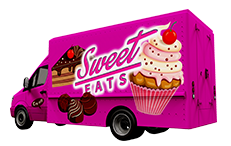|
| FOOD TRUCK BUSINESS PLAN |
|
Even before you decide what foods to sell, you'll want to consider how you want to sell them.
Clearly, your decision on how to sell your foods will depend on:
- Your startup money, budget and potential for returns
- Your commitment to the business: part time, full time, etc.
- Your creative ideas and what it will take to fulfill them
- Your experience at running a business
- The size of the business you want to start
- Your ideal demographic
These are a few of the considerations you will consider as you proceed, but for now, let's take a look at the common mobile-food entities. |
Food Trucks |
|
The food truck can carry any number of foods, and in some cases, more sophisticated equipment for storing, serving, cooking and preparing foods. Traditional food trucks were known for providing lunches, typically stocking sandwiches, kebobs, tacos, burgers and other standard fare for the lunch crowd. Many have expanded to include healthier vegetarian and vegan offerings, as well as not-so-healthy barbeque ribs. They do big business in corporate parks and places that have limited access to restaurants. Most food trucks are stocked from concessionaires, but there is a growing number that are associated with fast-food and midlevel restaurants.
Larger than carts, trucks can carry more food and handle more business. However, food trucks need more space to park both when doing business and when off-duty. Essentially, there are two types of food trucks. One is the mobile food preparation vehicle (MFPV) where food is prepared as customers wait, hopefully not very long. The other is the industrial catering vehicle (ICV), which sells only prepackaged foods. An MFPV costs more than an ICV, and both cost more than a food cart. Complying with health-department rules and regulations can also drive up food-truck costs. Clearly, a smaller truck, a used truck, or a truck with limited equipment costs less. Therefore, it is up to you to determine whether you'll be cooking in the truck, preparing food somewhere else and serving from the vehicle, or selling prepared and prepackaged foods.
|
|
Gourmet Food Trucks |
|
Basically , the same as a food truck, the gourmet food truck takes food quality to a higher level. They are run by ambitious young chefs who offer cuisine not typically found in food trucks, such as specialty crepes, kimchi chicken fries, velvet cupcakes, or the chicken masala meatballs with cilantro chutney found in gourmet food truck. Like Food Trucks, many gourmet trucks have specialties and themes. In addition, they let their clientele know where they'll be parked through their websites and social media sites like Twitter. While food trucks need not have kitchens, gourmet trucks are more likely to have food prepared on the spot -- and high-end food at that. At the start of the new gourmet food-truck craze, Metro’s was clearly the place to find such high-end dining.
|
|
 |
| The Mobile-Catering Business |
|
Mobile-catering trucks can be defined in a variety of ways and can overlap with mobile food trucks. Here are three differences: First, a catering truck is hired for a specific event such as a picnic, party or fair. Secondly, the person hiring the catering vehicle can select from a catering menu. Third, a catering vehicle can be used to transport the foods, which are then handed out from inside the truck or set up at the event or gathering, typically on trays or buffet style. This can mean providing the food to be served outdoors or parking and serving from the truck as the food trucks do. The differences are primarily in the manner of doing business. Nonetheless, the need for a reliable vehicle, licensing, permits, sanitary conditions, a business plan, and startup money are quite similar to the requirements of a mobile-food business.
One of the advantages of a mobile-catering business is that you are not risking as much in inventory because you are cooking and bringing food as ordered for the party. Therefore, you are covered for your food costs. You also have a specific destination, so you need not worry whether your favorite destinations will be busy. Typically, you are less dependent on good weather because many catered functions will be indoors. As long as you can get there with the food, you are usually OK. Of course, you do need to line up enough work to support your business. The difference between a mobile-catering business and other catering businesses is that you are using the mobility of the truck to show up rather than having a catering hall or venue.
|
|



